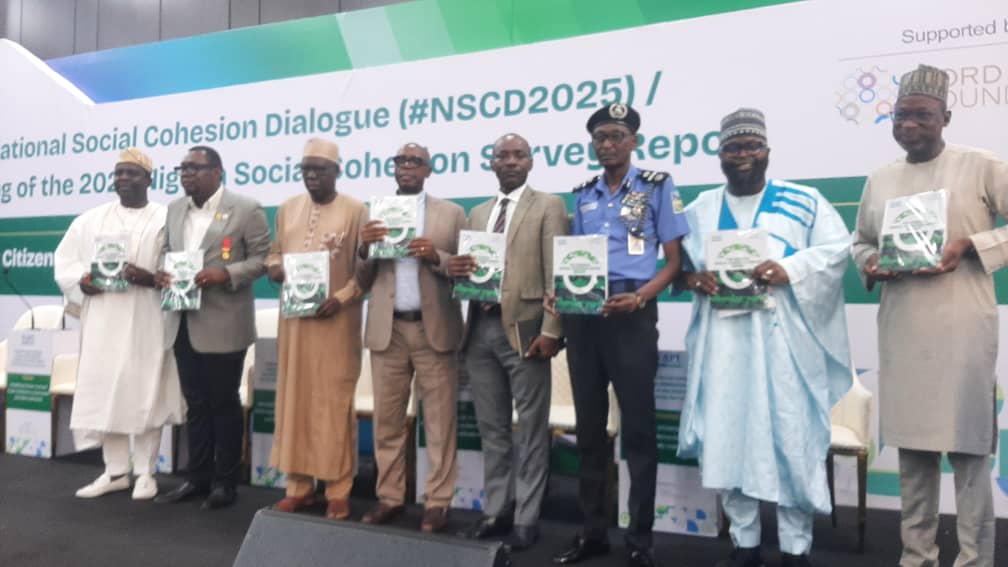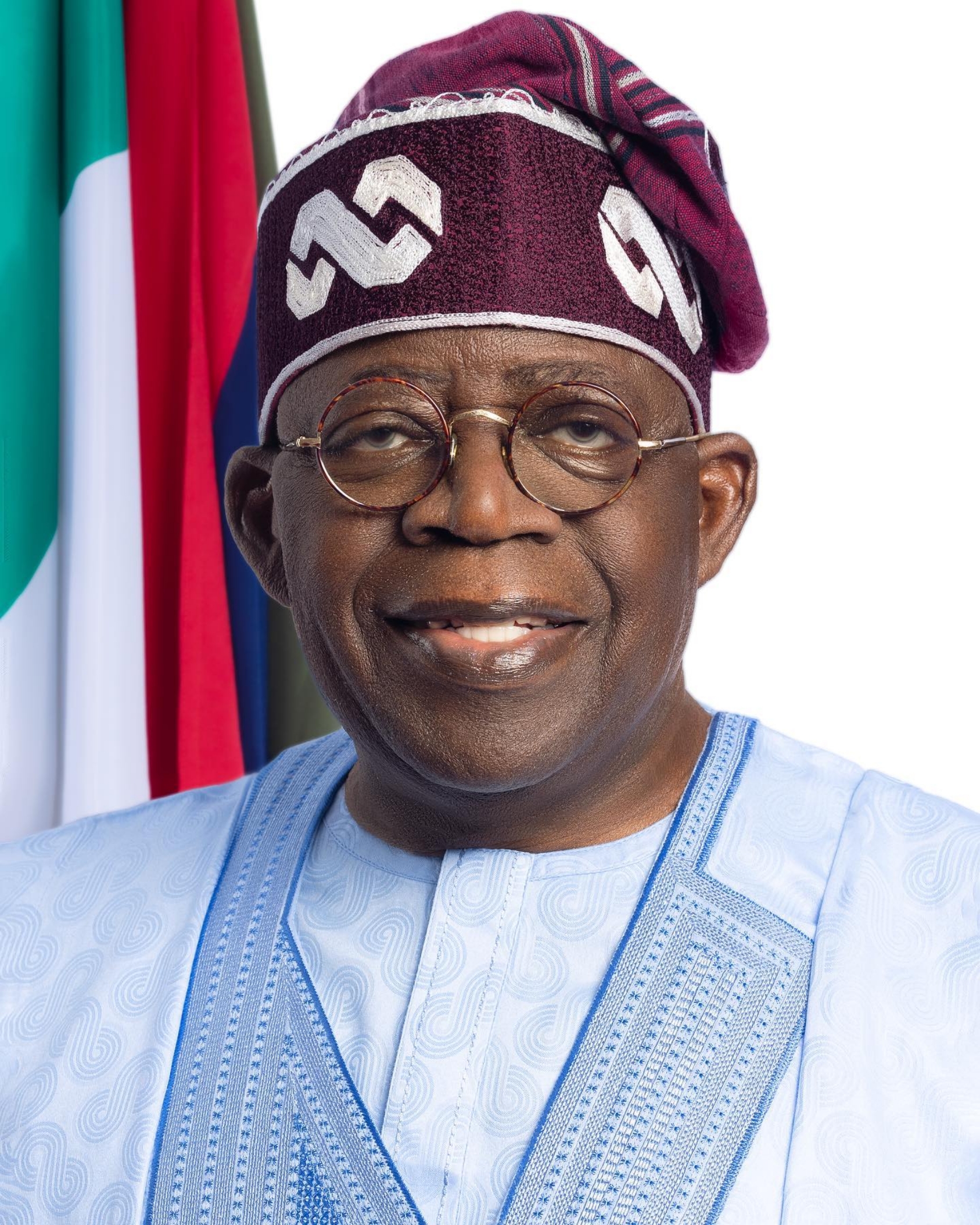News
API Charts New Course for National Unity in Nigeria, Unveils 2025 Nigeria Social Cohesion Survey

By Joel Ajayi
The Africa Polling Institute (API) has officially unveiled the 2025 edition of its flagship Nigeria Social Cohesion Survey, providing fresh insights into the state of unity, trust, and national identity across the country.
The report was launched during the National Social Cohesion Dialogue (#NSCD2025) held on Thursday in Abuja, with the theme: “Rebuilding Citizens’ Trust and Public Confidence in Government and Public Institutions.”
The event drew stakeholders from government, civil society, academia, international partners, and the media.
Now in its fifth edition since the inaugural survey in 2019, the Nigeria Social Cohesion Survey continues to serve as a vital policy tool, offering empirical data to inform national discourse and interventions on unity, inclusion, and public trust.
Presenting the findings, Executive Director of the Africa Polling Institute, Professor Bell Ihua, stressed the urgent need to mend the country’s social fabric, especially in the face of growing economic hardship, insecurity, and ethnic divisions.
“Social cohesion is the glue that holds a nation together. This report offers an honest reflection of how Nigerians feel about their identity, sense of belonging, and trust in one another and in public institutions,” said Prof. Ihua.
Key Findings: Declining Trust, Rising Solidarity in Adversity: One of the report’s most striking revelations is the deep mistrust citizens feel towards key institutions. According to the data:
83% of Nigerians expressed little to no trust in the government of President Bola Ahmed Tinubu.
80% reported low confidence in the National Assembly. 79% indicated distrust in the judiciary.
Despite this, the report found a surprising silver lining: Nigerians are increasingly united by shared socio-economic challenges, creating a sense of solidarity across ethnic and regional lines.
The survey also identified critical issues requiring government attention, including national identity, social justice, civic participation, and the economic burden faced by millions.
Prof. Ihua called on the government to take concrete steps to rebuild public trust, urging leaders to fulfill their constitutional obligations and prioritize policies that reduce poverty, combat insecurity, and lower the cost of living.
He emphasized the need for visible, impactful governance that delivers real benefits to ordinary citizens.
“Citizens need to see tangible results—such as security, affordable housing, and meaningful poverty reduction. The government must work to restore trust through inclusive, transparent, and people-centered policies,” he added.
In his address, former Minister of Transportation and ex-Governor of Rivers State, Rotimi Amaechi, called for greater citizen accountability in shaping Nigeria’s future.
Amaechi noted that while the elite understand the everyday struggles of ordinary Nigerians, real change must be driven by the people themselves.
“We must stop blaming the elite. Citizens must take responsibility for their own empowerment. Change comes from the bottom up,” he asserted.
He highlighted economic empowerment as a key strategy to combat crime and improve national wellbeing. Citing his experience as a former governor, he noted that timely payments to contractors and workers helped stimulate the economy and reduce crime in his state.
“When governments pay their debts and stimulate economic activity, it creates a ripple effect that benefits many,” he explained.
Amaechi also referenced global examples like the Bangladesh revolution, stressing that meaningful change requires sacrifice and collective effort from citizens—not just reliance on government or political leaders.
He called for national consensus and the development of a blueprint for shared prosperity, urging a renewed culture of transparency, accountability, and trust-building between the government and the people.
News
President Tinubu Praises NGX’s ₦100 Trillion Feat, Advocates Stronger Domestic Investment Culture

Joel Ajayi
President Bola Tinubu has praised corporate Nigeria, citizens, and other stakeholders in the Nigerian capital market for surpassing the N100 trillion milestone on the Nigerian Exchange (NGX).
In a statement issued on Thursday by Special Adviser to the President (Information & Strategy)Bayo Onanuga, President Tinubu described this record achievement as an inspiration for the investing public operating in the money and capital markets.
He urged Nigerians to deepen their investments in the local economy, assuring that 2026 will yield even greater returns as his administration’s economic reforms continue to deliver stronger outcomes.
“With the Nigerian Exchange (NGX) crossing the historic N100 trillion market capitalisation mark, the country is witnessing the birth of a new economic reality and rejuvenation.
“In 2025, while many of the world’s markets struggled with stagnation or tepid recovery, the NGX All-Share Index was on the ascent. It closed 2025 with a 51.19% return, higher than the 37.65% recorded in 2024. This performance ranks among the highest in the world. Year-to-date returns have significantly outpaced the S&P 500, the FTSE 100, and even many of our emerging-market peers in the BRICS+ group.
“Nigeria is no longer a frontier market to be ignored—it is now a compelling destination where value is being discovered. As the stock market reflects the entire economy, its stellar performance is a significant indicator of the country’s economic health and the confidence investors have in our economy
“On the NGX, we have witnessed remarkable performances from listed companies across all sectors. From blue-chip industrial giants that have localised their supply chains, to a banking sector that has demonstrated resilience and technological innovation, Nigerian companies are proving that the country can deliver strong returns on investment.
“And we are just getting started. The pipeline for new and upcoming listings looks robust. More indigenous energy firms, tech unicorns, telecoms, and infrastructure-heavy entities are seeking to access the public market to fund their expansion. As these firms are listed, they will boost market capitalisation and deepen democratic ownership of the Nigerian economy.
“We are not celebrating the superlative stock market performance in isolation. We are also celebrating the microeconomic effects of our reforms. After the initial headwinds that followed our reforms, we are finally seeing a bend in the inflation curve. Crucial monetary tightening and the removal of distortionary ‘Ways and Means’ financing have restored stability to the Naira. Furthermore, investments in the agriculture sector have contributed to a consistent decline in inflation over the past eight months. From a 24-month high of 34.8% in December 2024, inflation decelerated to 14.45% as of November 2025,
November 2025, with projections indicating it will reach 12% in 2026. Indeed, inflation is likely to fall below 10 per cent before the end of this year, leading to improved living standards and accelerated GDP growth. The year 2026 promises to be an epochal year for delivering prosperity to all Nigerians.
“Also noteworthy is the status of our nation’s current account, a valid measure of our overall economic health. In 2024, Nigeria posted a surplus of $16 billion. According to the Central Bank of Nigeria (CBN), our current account balance is projected to rise to $18.81 billion in 2026, up from $16.94 billion in 2025.
“Under our administration, Nigeria is exporting more and importing less of what we can produce locally. Non-oil exports surged by 48% by the third quarter of 2025, totalling N9.2 trillion. Exports to Africa alone rose by 97% to N4.9 trillion. Manufacturing exports increased by 67% year-on-year in the second quarter of 2025, suggesting a strong close to the year.
“Nigeria’s foreign reserves have crossed the $45 billion mark, giving the Central Bank the firepower to maintain stability. The Naira has stabilised, moving away from the volatility that once fuelled speculation. The Central Bank of Nigeria, in its latest outlook, projects foreign reserves will cross the $50 billion threshold in the first quarter of 2026.
“We are also seeing an expansion of the rail networks, the completion of major arterial roads and the revitalisation of our ports. With the transformative Lagos-Calabar, Sokoto-Badagry superhighways” the nation’s infrastructure is growing.
“Our medicare facilities are improving, and medical tourism costs are declining. Our students benefit from the Nigeria Education Loan Fund (NELFUND), and universities are receiving increased research grants.
“Nation-building is a process, not a destination. Hard work, sacrifices, and the focus of its citizens build a nation. The N100 trillion market capitalisation is a signal to the world that the Nigerian economy is robust and productive.
“As your leader, I pledge to continue working unrelentingly to build an egalitarian, transparent, and high-growth economy that will be further catalysed by the historic tax and fiscal reforms that came into full implementation from January 1,” President Tinubu said.
-

 Featured7 years ago
Featured7 years agoLampard Names New Chelsea Manager
-

 Featured6 years ago
Featured6 years agoFG To Extends Lockdown In FCT, Lagos Ogun states For 7days
-

 Featured6 years ago
Featured6 years agoChildren Custody: Court Adjourns Mike Ezuruonye, Wife’s Case To April 7
-

 Featured7 years ago
Featured7 years agoNYSC Dismisses Report Of DG’s Plan To Islamize Benue Orientation Camp
-

 Featured4 years ago
Featured4 years agoTransfer Saga: How Mikel Obi Refused to compensate me After I Linked Him Worth $4m Deal In Kuwait SC – Okafor
-
Sports3 years ago
TINUBU LAMBAST DELE MOMODU
-

 News1 year ago
News1 year agoZulu to Super Eagles B team, President Tinubu is happy with you
-
Featured6 years ago
Board urges FG to establish one-stop rehabilitation centres in 6 geopolitical zones
